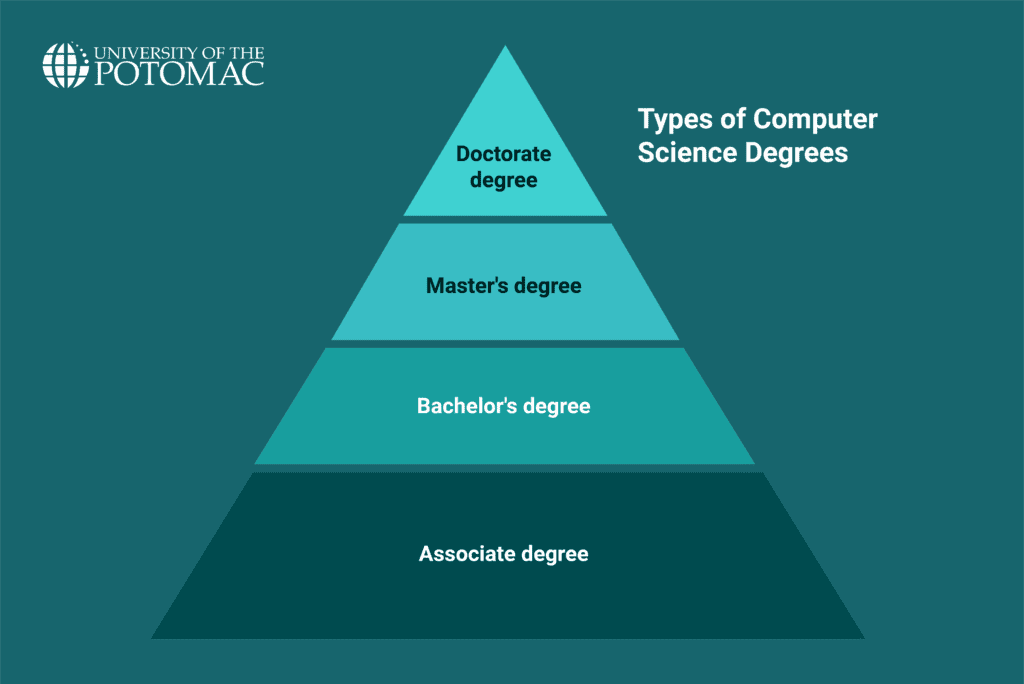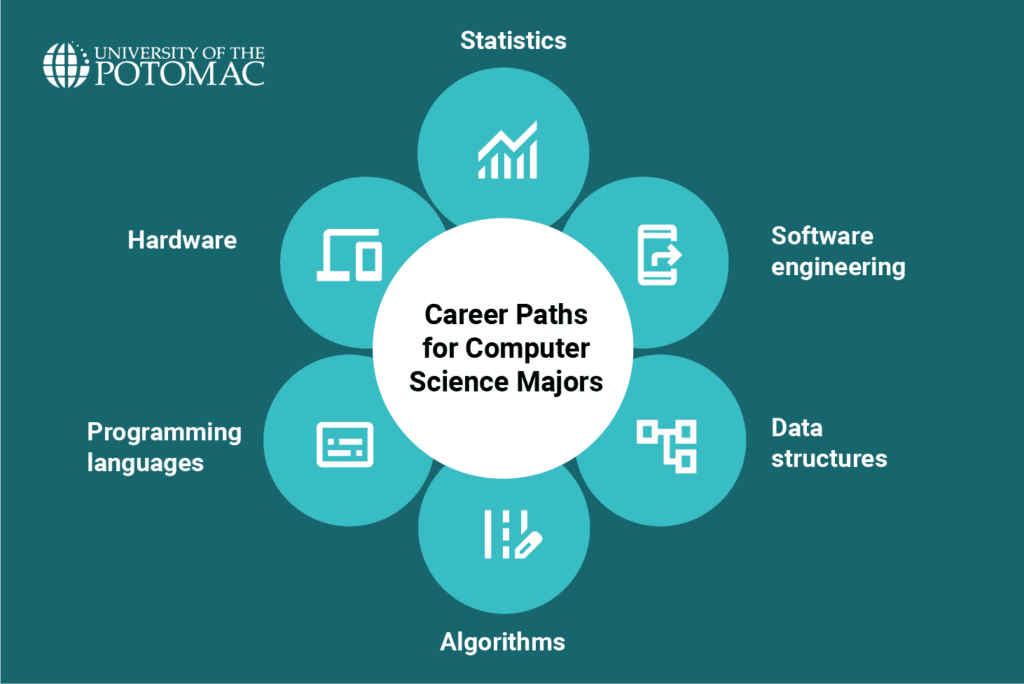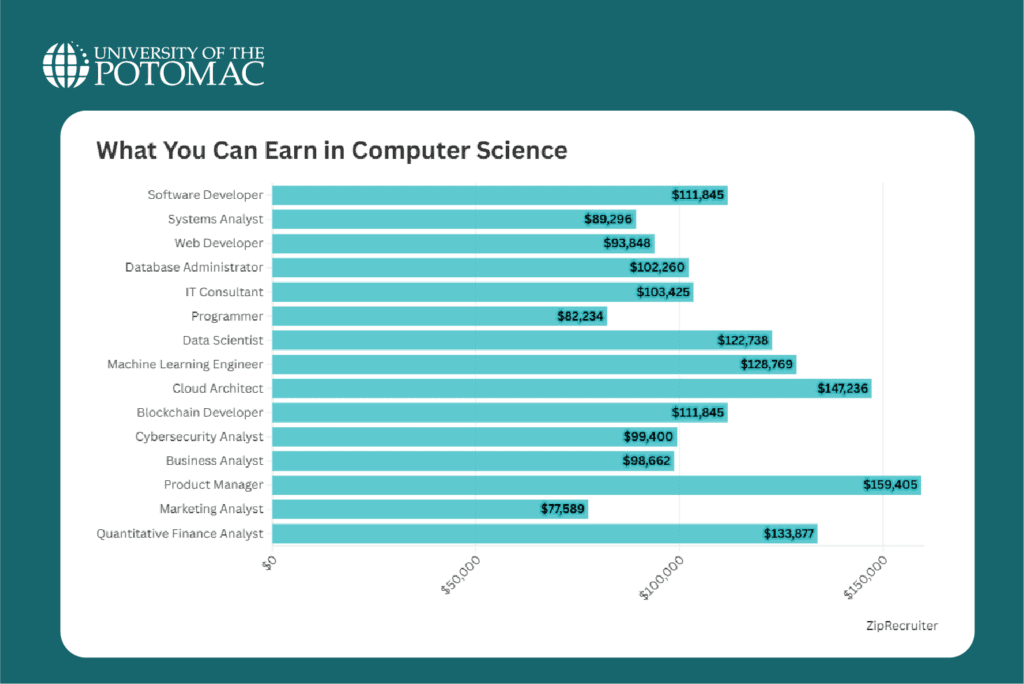Key Takeaways
- A computer science major focuses on designing, building, and understanding computing systems and software.
- You can study computer science at multiple levels, including associate, bachelor’s, master’s, and doctorate degrees.
- With a computer science degree, you can pursue careers like software developer, cybersecurity analyst, network security manager, and data scientist.
In recent years, interest in the tech field and STEM majors has grown steadily. According to the most recent data available, nearly 60,631 degrees in computer science were awarded in the U.S., adding to a workforce that already includes over 2 million professionals. And that number is only expected to grow.
As technology continues to evolve in itself and permeate nearly every aspect of modern life, more and more students are seeing the value—and the opportunity—in choosing a computer science major.
What Is a Computer Science Major?
A major in computer science represents the kind of academic program focused on the development and understanding of computers and computational systems.Selecting this major indicates that, among other things, you intend to focus your college education on understanding how computers operate, how software is created, and how digital systems can be enhanced or optimized..
Though it is related to fields like information technology (IT), software engineering, or data science, computer science has its own distinct focus. Technically, it sits at the foundation of the other three, exploring many theoretical and practical aspects of computing that are then used across various fields.
Computer science can be studied at several academic levels that offer varying levels of depth and specialization. The most common ones include:

- Associate degree: A foundational, two-year introduction to the fundamentals of computing.
- Bachelor’s degree: A common starting point for students, typically four years
- Master’s degree: Deeper, specialized learning after a bachelor’s
- Doctorate degree: The highest level of academic study in computer science
At the University of the Potomac, we offer a Bachelor of Science in Computer Science that builds a strong foundation in core areas like programming, systems design, and software development.
For those looking to advance further, we offer the option of pursuing our Master of Science in Computer Science program, and for those aiming to reach the highest level, our Doctor of Computer Science program offers a path to explore advanced challenges and drive innovation in the field.
What Do You Learn in a Computer Science Major?
A computer science major introduces students to a wide and incredibly interconnected field that spans many systems and software that make up modern computing. The curriculum of these programs should be designed to balance theoretical foundations with practical skills.
At the University of the Potomac, that is the case, as students build this foundation through a series of core courses and then have the flexibility to explore elective and advanced topics, all while gaining a set of essential skills that are valuable across the tech industry.
Core courses and subjects
Every computer science degree starts with core subjects that introduce the central ideas and tools in the field. These courses build the groundwork students need for more advanced study and future specialization.
At Potomac, students in the Bachelor of Science in Computer Science program, for instance, take core courses such as:
- Introduction to Data Communication and Networking
- Introduction to Programming
- Foundations of Cyber Security
- Network Security Management
- Data Structures and Algorithms
- Software Engineering
At the master’s level, students move on to more advanced core topics. For example, our program covers courses such as:
- Foundations of Algorithms and Data Structures
- Cloud Computing from the Ground Up
- Executive Leadership
- Design and Analysis of Algorithms
- Enterprise Data Management and Administration
- Linguistics of Programming Languages
- Computer Systems Architecture
- Cyber Crime and Homeland Security
Elective and advanced topics
Once students complete their core requirements, they can choose from a wide range of electives and advanced topics. These options allow them to explore the areas of computer science that interest them most and prepare for potential specialization in those fields.
Some common advanced topics students choose include:
- Artificial Intelligence
- Machine Learning
- Cybersecurity
- Mobile App Development
- Cloud Computing
- Robotics
Essential skills
Students in the computer science programs at the University of the Potomac gain a well-rounded blend of theoretical knowledge and practical skills. Through each level of study—bachelor’s, master’s, and doctoral—they learn how to:
- Apply mathematical and algorithmic principles to design computer systems
- Analyze complex problems and identify computing requirements for solutions
- Design, develop, and implement secure and reliable software and network systems
- Use modern software development tools and computing platforms
- Understand and follow technical standards, ethics, and intellectual property regulations
- Communicate technical concepts clearly to both technical and non-technical audiences
- Collaborate in different teams and lead cross-functional projects
- Analyze scholarly research and apply findings to various computing challenges
- Conduct independent research and development in advanced areas of computer science
Requirements for a Computer Science Degree
It takes a lot of commitment to enroll in a computer science program, finish it, and receive your degree.
To get started on a computer science degree, students typically need to demonstrate they’ve completed high school or an equivalent and, in many cases, show readiness in math and science. Some other required or at least preferred prerequisite knowledge often includes:
- Algebra
- Pre-Calculus
- Basic Computer Skills
- Introductory Programming
- General Science or Physics coursework
Though not always mandatory, these subjects help students grasp the logic and structure used in core computer science courses.
Once admitted, a computer science degree requires a significant time commitment. Students pursuing a Bachelor’s degree typically need to complete 120–130 credit hours, which takes about four years of full-time study.
For each program, students typically need to complete a common core of courses, followed by specialized coursework for personal and professional growth. In certain cases, particularly for graduate programs, they may also need to submit a final thesis or research paper.
Career Paths for Computer Science Majors

Computer science is quite a broad field, as it is connected, in one way or another, with nearly every aspect of modern life. It combines elements of hardware, programming languages, algorithms, data structures, software engineering, statistics, mathematics, and even computer architecture and design.
Because of this range, a computer science major can lead to a wide variety of career paths, both technical and non-technical. Many of these roles are highly lucrative, making computer science one of the most valuable degrees on the market.
Traditional career options

There are some careers that have long been linked with computer science and continue to serve as go-to choices for graduates entering the tech workforce. These roles typically involve designing, developing, maintaining, or consulting on computer systems, software, and networks.
A few of the most common traditional career options include:
Interested in pursuing a degree?
Fill out the form and get all admission information you need regarding your chosen program.
This will only take a moment.
Message Received!
Thank you for reaching out to us. We will review your message and get right back to you within 24 hours.
If there is an urgent matter and you need to speak to someone immediately you can call at the following phone number:
- We value your privacy.
- Software developer – Designs and builds software applications
- Average annual salary: $111,845
- Systems analyst – Evaluates and improves IT systems for businesses
- Average annual salary: $89,296
- Web developer – Creates websites and web applications
- Average annual salary: $93,848
- Database administrator – Manages and secures data systems for organizations
- Average annual salary: $102,260
- IT consultant – Advises others on technology strategy and solutions
- Average annual salary: $103,425
- Programmer – Writes code for applications and systems
- Average annual salary: $82,234
Alternative and emerging careers
There are also many new career opportunities that have emerged in response to trends like AI, data analytics, cybersecurity, blockchain, and cloud computing. These roles often require deeper specialization, but they are growing fast and pay very well.
Some such in-demand roles include:
- Data scientist – Uses statistical and computational methods to extract insights from data
- Average annual salary: $122,738
- Machine learning engineer – Builds and trains AI models and learning algorithms
- Average annual salary: $128,769
- Cloud architect – Designs cloud infrastructure for businesses and manages cloud solutions
- Average annual salary: $147,236
- Blockchain developer – Develops decentralized applications and smart contracts
- Average annual salary: $111,845
- Cybersecurity analyst – Protects systems from digital threats and attacks
- Average annual salary: $99,400
Non-tech careers
A significant advantage of earning a computer science degree is that the skills you gain can easily be applied in a wide range of non-technical roles as well. More companies now seek professionals who understand technology even if their roles aren’t directly in IT.
Some non-tech roles where computer science majors are valued include:
- Business analyst – Bridges the gap between business needs and tech solutions
- Average annual salary: $98,662
- Product manager – Oversees development of tech products from concept to launch
- Average annual salary: $159,405
- Marketing analyst – Uses data tools to evaluate marketing strategies and customer behavior
- Average annual salary: $77,589
- Quantitative finance analyst – Applies modeling techniques to financial data and markets
- Average annual salary: $133,877
How to Succeed as a Computer Science Major
It’s understandable to feel a bit intimidated by computer science at first. It doesn’t matter if you’re new to coding or already a tech enthusiast; you must remind yourself that you don’t have to be an expert from day one. What matters most is your willingness to learn and grow.
The best thing you can do to achieve success is to stay organized and manage your time well from early on. Though you’ll have to deal with different assignments, coding tasks, and projects, having a system will help you stay on track and feel less overwhelmed. Take it one step at a time—progress in computer science is often about building small pieces that eventually come together.
Try to practice coding regularly, even outside of class. Working on personal projects or solving small problems helps turn abstract concepts into real skills—and it’s more satisfying than you might expect.
Once you feel ready, seek out opportunities to gain real-world experience through internships, part-time jobs, or even small freelance projects. They’ll give you a taste of how the industry works and can make everything you’re learning feel more relevant and purposeful.
Most importantly, allow yourself to grow at your own pace. You’re not expected to know it all at once—and no one else does either.
Conclusion
Computer science is a future-focused field that is filled with opportunity and impact. But success and rewards won’t come just by choosing this path. It depends on how hard you work and which program you choose to help you make the most of it.
At the University of the Potomac, our undergraduate and graduate computer science programs are built to prepare you in the best way for all this field has to offer and support you every step of the way.
So, take some time to look through our programs, reflect on the practical and personal benefits of studying computer science, and ask yourself: Is this something I can see myself growing in? If the answer is yes, then join us, and together, we can program your future.
Frequently Asked Questions
Is computer science a good major?
Definitely! It offers strong job prospects, high salaries, and wide career flexibility across industries.
Is computer science a STEM major?
Yes, computer science is one of the core fields within STEM.
What is the highest-paying job in computer science?
Roles like machine learning engineer, cloud architect, and IT director are among the highest-paying jobs.
What are the specializations in computer science?
Common specializations include software engineering, database management, cybersecurity, game design, and mobile application development.










